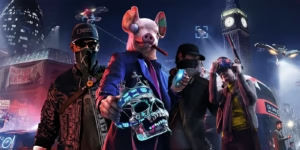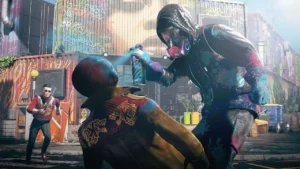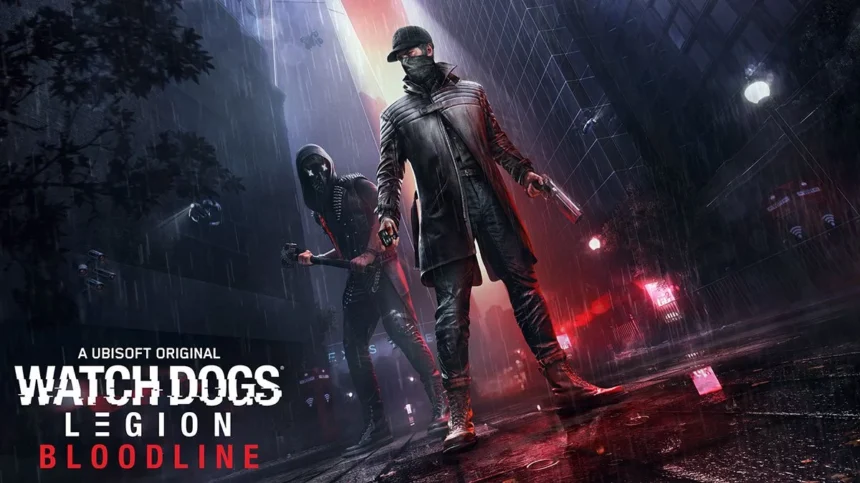When Ubisoft Toronto released Watch Dogs Legion in October 2020, it marked a bold step forward in the franchise. Unlike its predecessors, which centered around a single main protagonist, Legion placed its entire identity on a daring concept: anyone you meet in the game’s sprawling open world of London can become the hero. This was more than just a gimmick—it redefined what open-world role-playing could mean. Set in a near-future dystopian version of London, the game explores surveillance, authoritarian power, and the role of ordinary citizens in fighting back.
Watch Dogs Legion – Quick Bio Table
| Feature | Details |
|---|---|
| Title | Watch Dogs: Legion |
| Developer | Ubisoft Toronto |
| Publisher | Ubisoft |
| Series | Watch Dogs |
| Genre | Action-adventure, Open-world |
| Release Date | October 29, 2020 |
| Platforms | PlayStation 4, PlayStation 5, Xbox One, Xbox Series X/S, Windows, Stadia |
| Game Setting | Near-future dystopian London under private military rule (Albion) |
| Key Feature | “Play as Anyone” – recruit and control any NPC in the game |
| Game Modes | Single-player, Online multiplayer (co-op & competitive modes) |
| DLC / Expansions | Bloodline (2021) featuring Aiden Pearce & Wrench |
| Notable Tools | Spider-bots, drones, hacking systems, AR cloaks |
| Themes | Surveillance, authoritarianism, collective resistance |
| Reception | Mixed to positive – praised for innovation, criticized for shallow story |
| Last Update | January 2022 (no further updates planned) |
Setting the Stage in London
The game takes place in a post-Brexit London under the thumb of Albion, a private military corporation that enforces a state of constant surveillance and fear. From the neon-lit streets of Camden Market to the shadow of Big Ben, Ubisoft recreated London with stunning detail. This digital city is alive with bustling NPCs, side conversations, and dynamic events that mirror real-world diversity. For players, this setting provides more than just a playground—it is the very heart of the resistance story. London’s fractured politics, economic struggles, and rising authoritarianism ground the narrative in a reality that feels unsettlingly possible.
The “Play as Anyone” Innovation

The standout feature of Watch Dogs Legion is the “Play as Anyone” mechanic. Rather than focusing on one protagonist, every person on the street can be recruited into DedSec, the hacker collective at the core of the series. Each character is procedurally generated, carrying unique traits, skills, and sometimes drawbacks. A construction worker might have access to heavy drones, while a retired spy brings stealth gadgets and firearm expertise. Even seemingly ordinary people, like an accountant or a bus driver, can become unexpected heroes.
This system not only adds variety to gameplay but also reframes how players see the world. No longer is the game about one hacker’s journey—it is about collective action. This mechanic embodies the idea that resistance movements are not carried by individuals alone but by communities.
Recruitment and Storytelling
Recruitment missions breathe life into this mechanic. To add someone to DedSec, players must first gain their trust, often by helping with personal problems or standing up to Albion’s oppression. These smaller stories give insight into the struggles of ordinary Londoners, from exploited workers to those wrongfully imprisoned. While critics argue that these storylines sometimes lack depth, they still add texture to the city and make it feel alive.
The absence of a singular protagonist means the larger narrative sometimes feels fragmented. Yet the flip side is that Legion shifts focus toward the power of collective struggle, creating a different but intentional emotional tone. The story becomes less about a hero’s journey and more about a movement rising from the ground up.
Tools of Resistance
Technology has always been central to the Watch Dogs franchise, and Legion continues this tradition with flair. Players can hack surveillance cameras, hijack drones, and deploy spider-bots that crawl through vents or stun enemies. Each character’s skills enhance these tools in distinct ways. For instance, a hacker with advanced tech expertise can disable entire security systems, while a brawler can rely on brute force when things go wrong.
The futuristic gadgets emphasize the tension between surveillance and counter-surveillance. Albion may control the city with high-tech monitoring, but DedSec turns those same systems against them. This tug-of-war creates dynamic missions where creativity is often rewarded more than straightforward violence.
Online Expansion and Multiplayer
Ubisoft expanded Legion with online multiplayer in March 2021, allowing players to join forces in cooperative missions across London. This feature extended the life of the game, bringing new ways to approach challenges with friends. Special content updates introduced crossover characters like Aiden Pearce from the original Watch Dogs and Wrench from Watch Dogs 2.
The Bloodline expansion added a narrative arc that brought both Aiden and Wrench into the world of Legion, bridging the gap between the series’ installments. While Ubisoft announced in January 2022 that no further updates would be released, the existing content continues to provide a rich experience for players.
Strengths and Weaknesses
The bold design of Legion is both its greatest strength and its most debated weakness. On the positive side, the freedom to recruit and experiment with different playstyles makes the game endlessly flexible. London feels alive and reactive, and missions often allow for creative problem-solving. The theme of collective resistance resonates in a world where surveillance and authoritarianism are ongoing global concerns.
However, critics point out that the absence of a central hero can limit emotional connection. Procedurally generated characters sometimes lack personality beyond their traits, which can make the story feel disjointed. Some missions are repetitive, and driving mechanics received mixed feedback. Yet despite these issues, many players appreciate the ambition behind the game and its attempt to break away from formulaic storytelling.
Cultural and Political Undertones
Beyond gameplay, Watch Dogs Legion reflects real-world anxieties. The game’s dystopian London is not a far-fetched fantasy—it is a mirror held up to growing concerns about surveillance, corporate control, and declining democratic values. Ubisoft weaves Brexit-era themes into the background, exploring how political instability and fear can lead to authoritarian rule.
Some critics argue that the commentary remains surface-level, never fully committing to a deeper critique. Still, the fact that a mainstream AAA title engages with these issues is significant. It pushes players to consider how technology and politics intersect in their own lives.
Legacy and Impact

Two years after its final update, Watch Dogs Legion remains a divisive but important entry in the franchise. For some, it is a bold experiment that successfully challenges the idea of a single protagonist in open-world games. For others, it is a title that overreached and sacrificed narrative depth for mechanics. Regardless of opinion, its “Play as Anyone” system will likely influence future game design, proving that innovation often requires risk.
The game also stands as a time capsule of sorts, reflecting a world grappling with surveillance culture, authoritarian threats, and social upheaval. For players revisiting it today, Legion remains both entertaining and thought-provoking.
Conclusion
A Deep Dive into Watch Dogs Legion and Its Unique Playstyle reveals a game that dared to break the mold. By shifting focus from a single protagonist to a city of potential heroes, Ubisoft crafted an experience unlike anything else in the franchise. Though not without flaws, its ambitious design, rich setting, and thematic undertones make it a standout in modern gaming. Whether you see it as a flawed masterpiece or a missed opportunity, Watch Dogs Legion remains a fascinating exploration of what it means to resist, rebuild, and fight for freedom in a digital age.
FAQs
Q1. What is Watch Dogs Legion about?
Watch Dogs Legion is an action-adventure open-world game set in a dystopian, near-future London controlled by a private military group called Albion. Players join the hacker collective DedSec to fight back against surveillance, oppression, and corruption.
Q2. What makes Watch Dogs Legion unique compared to other games?
The game’s defining feature is the “Play as Anyone” system. Instead of following a single main character, players can recruit and control virtually any NPC in the game world, each with unique skills, traits, and backstories.
Q3. On which platforms can I play Watch Dogs Legion?
The game is available on PlayStation 4, PlayStation 5, Xbox One, Xbox Series X/S, Windows PC, and Google Stadia.
Q4. Does Watch Dogs Legion have multiplayer?
Yes. Online multiplayer was introduced in March 2021, allowing co-op missions, tactical operations, and competitive PvP modes. Players can team up with friends to complete challenges across London.
Q5. Is there any DLC for Watch Dogs Legion?
Yes. The major expansion is Bloodline (2021), which brings back Aiden Pearce from the first Watch Dogs and Wrench from Watch Dogs 2. Additional free content updates included new missions and characters.
Q6. How was Watch Dogs Legion received by players and critics?
Reception was mixed to positive. Critics praised its innovation and London’s detailed open world but noted weaknesses in storytelling, character depth, and mission repetition.






